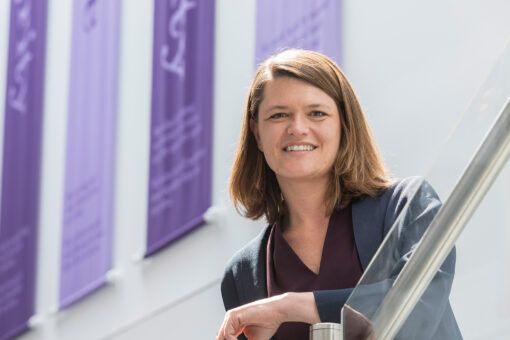
In June, Ark Elvin won the Secondary School Award in Place2Be’s Wellbeing in Schools Awards, 2022. In recognition of World Mental Health Day 2022, the school’s principal Rebecca Curtis shares what’s been most important in their approach to mental health.
“When I joined Ark Elvin in 2017 the school was in special measures. We were the sink school in Brent. When you walked into the building, there were lots of reasons why children were misbehaving, the challenges they were facing growing up in an area of significant disadvantage and going to a failing school.”
Five years later, the school is oversubscribed. Students are proud to come to school and there’s improvement in every measure. “I honestly don’t think we could have improved the way we have without our focus on mental health. It’s made our progress deep, genuine and thorough. You’re not just superficially improving exam results, you’re building relationships and trust between children and adults, which allows them to grow and develop as human beings, not just pass exams.”
Partnering with Place2Be has been critical, but essential school improvement had to come first. “It can only work if you have the structures and systems in place for students to be able to feel safe, work hard and make progress in school. If you don’t have the behaviour, teaching and curriculum right then any wellbeing interventions will feel superficial. We introduced Place2Be a year after I joined. There were still some issues with behaviour but we’d got the structures and systems in place.”
Once Place2Be was introduced, starting at two days a week, their staff were made to feel part of the school. “How you work with Place2Be is key. They should feel like the English department or the maths department.” This means making sure they have dedicated space, have a key contact who can influence decision making, are attending school meetings and meet the principal regularly. ‘They can’t be an external organisation that just come in, see your kids and leave.’
Through form time lessons, mental health has been embedded into the curriculum. “We have built wellbeing, mindfulness and gratitude concepts into our day-to-day life. Anyone who knows about wellbeing knows that it begins with gratitude.” The curriculum introduces students to mindfulness approaches, zones of regulation, understanding the triggers for their stress and practicing asking for help. “Having that as part of the daily curriculum means that adults and children are talking about mental health regularly and that normalises it.”
“The great thing about mental health in young people is that it’s fixable.”
Boys self-refer to Place2Be at Elvin as much as girls. Nationally, 36% of referrals to NHS talking therapies are for men. “Place2Be have noticed that and said it’s really unusual. I think that’s because we have lots of male role models in school who are openly talking about mental health.” Raheem Sterling, a former student, has also promoted the importance of mindfulness in visits to the school. “He sent his mindfulness therapist to our school to train us on meditation. We had 213 students meditating in silence in the hall.”
Rebecca believes passionately that every school should be funded to have a full-time counselling service. Funding for counselling at Elvin has only been possible through private donations. “Our school services are picking up really extreme cases, children who have had not just suicidal ideation but who have actually attempted suicide. But they would have to wait a year for counselling through CAMHS.” It also makes sense for wider society. £1 spent on Place2Be has the potential to bring £8 of savings later in life.
For now, the school will keep improving its approach and fundraising to sustain it. “You never feel you’ve finished with mental health. The more we do, the more we realise we can do.” A meditation room will open in the autumn term. Other ideas include a mindfulness garden and support groups. “The great thing about mental health in young people is that it’s fixable. Now’s the time to do it. Not when they’re in their 20s, their 30s, their 50s or their 70s and they’ve lived a life affected by mental health. We need to do it now, so they can live a happy and fulfilled life.”